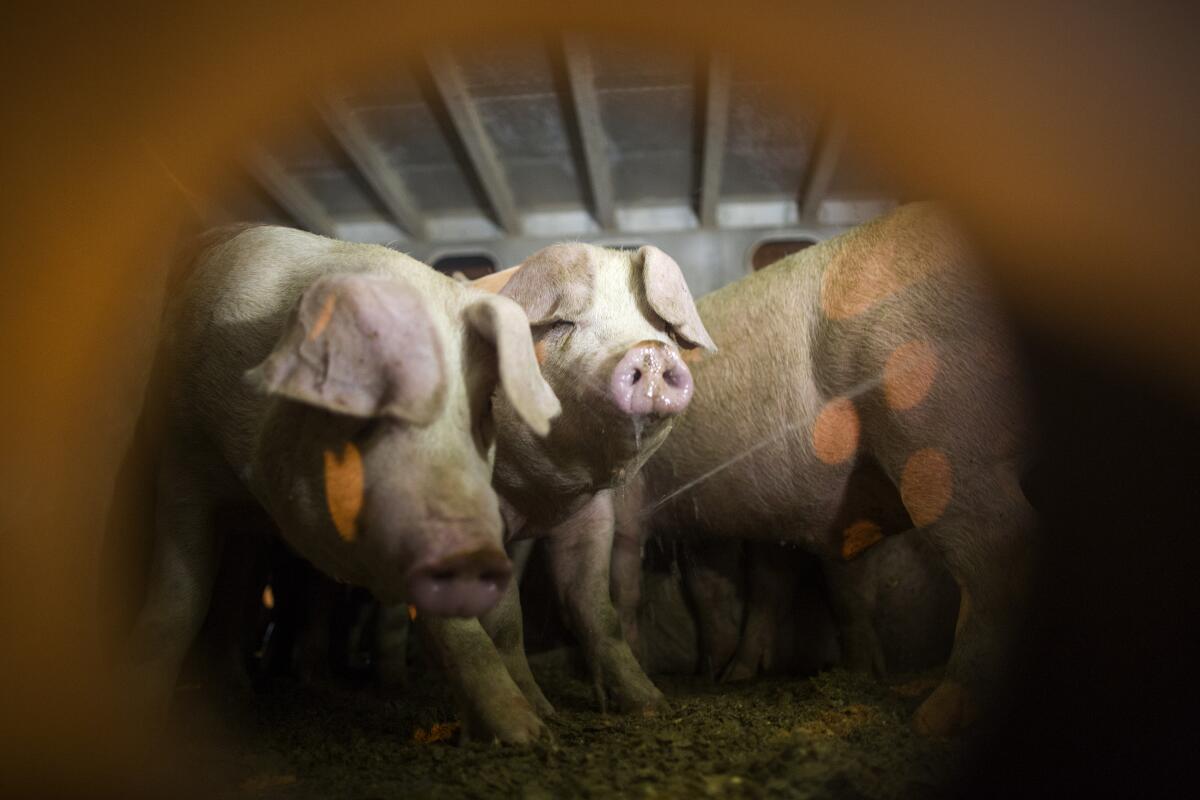Supreme Court justices appear skeptical of California animal welfare law

WASHINGTON â The Supreme Court justices sounded wary Tuesday of Californiaâs animal welfare law and its protections for breeding pigs, warning it could set off a wave of state laws that put a wide array of restrictions on products moving nationwide.
Pork producers based in the Midwest challenged the California ballot measure that would ban the sale of pork in the state if it originated with the extreme confining of breeding pigs in narrow metal cages.
They argued that Proposition 12, which was approved by California voters in 2018, is unconstitutional because its âpractical effectâ would be to force hog farmers across the nation to make costly changes in how they raise and confine their breeding pigs. They noted that more than 99% of the pork sold in California comes from other states.
âA state may not project its legislation into other states,â said Chicago attorney Timothy Bishop, representing the National Pork Producers Council. âWe will not have a national economic union if California can impose its moral views this way.â
He argued that if Californiaâs law is upheld, Oregon could require that products sold there from other states must be made by workers who were paid the stateâs higher minimum wage, or Texas could limit sales to products made entirely by lawful U.S. residents.
The Biden administration joined the case on the side of the pork producers and stressed a similar argument. Californiaâs Proposition 12 âimposes a substantial burden on interstate commerce,â said Deputy Solicitor Gen. Edwin Kneedler. âIt invites conflict and retaliation and threatens the balkanization of the national economic union.â
California Solicitor Gen. Michael Mongan defended the law on the grounds that it applied only to pork sold in the state and not elsewhere.
âCalifornia voters chose to pay higher prices to serve their local interest in refusing to provide a market to products they viewed as morally objectionable and potentially unsafe,â he said.
But he ran into objections from both liberal and conservative justices who foresaw a threat of similar measures.
âWe live in a divided country,â Justice Elena Kagan said, âand the balkanization that the framers were concerned about is surely present today.â
Itâs not hard to imagine California passing pro-labor laws while Texas adopts anti-labor, right-to-work laws for products sold there, she added.
âSo, could you have California pass a law that said weâre not going to buy any pork from companies that donât require all their employees to be vaccinated, or from corporations that donât fund gender-affirming surgery?â asked Justice Amy Coney Barrett.
Mongan said it âwould be problematicâ if a law focused on âa general company-wide policyâ rather than the production of a product. But the justices sounded doubtful about that distinction.
At one point, Justice Ketanji Brown Jackson suggested the California law may have gone further than necessary. Why not require labeling instead, she said, so consumers could avoid pork if it is originated with pigs subjected to cruelty?
âWhy couldnât the state advance its interest in a less burdensome way?â she asked.
The attorney for the pork producers said they had no objection to a labeling requirement.
The tenor of the two-hour argument suggested the court will rule for the pork producers. The strongest voice on Californiaâs side appeared to be Justice Neil M. Gorsuch. He said the Constitution empowers Congress, not judges, to set national regulations that protect interstate commerce. He said it would be better to âdefer to the statesâ than to have judges decide which state laws have too much effect on businesses in other states.
In 2018, 63% of California voters approved Proposition 12, which prohibited the sale of eggs or meat that originates from the extreme confinement of egg-laying hens, breeding pigs or calves raised for veal. The law was due to take full effect this year.
While some of the largest meat packers, including Hormel and Tyson, said they could comply, the National Pork Producers Council sued, alleging the law is unconstitutional because it would require farmers in the Midwest and North Carolina to change how they raise and confine their breeding pigs.
To comply with the California law, breeding pigs would have to be given larger pens that would allow them to stand and turn around, or they could be confined in an open area with other pigs. The producers said those changes would increase their costs by 9%.
The pork producers lost before a federal judge in San Diego and the 9th Circuit Court of Appeals, which said they had no claim of a constitutional violation. But in March, the Supreme Court agreed to hear the industryâs appeal.
âCalifornia has no legitimate interest in the housing conditions of out-of-state animals,â Solicitor Gen. Elizabeth B. Prelogar said in a brief siding with the pork producers. âStates may not otherwise regulate out-of-state entities by banning products that pose no threat to public health or safety based on philosophical objections to out-of-state production methods or public policies that have no impact in the regulating state.â
Attorneys for California also contended that the pork producers challenging the law do not represent the entire industry, noting that three years ago, ânearly a third of the nationâs pork industry had converted to sow breeding facilities to allow for group housingâ where breeding pigs may move around freely.
âPork produced this way may be marketed as âcratefreeâ pursuant to USDA regulations,â and can be separated from other pork products, they said.
The Constitution says Congress may âregulate commerce...among the several states.â Congress has not regulated the confinement of breeding pigs, but the court has struck down state laws that seek to protect businesses from out-of-state competition. By contrast, in this case, National Pork Producers vs. Ross, the court will decide whether a state law is unconstitutional because it will have a strong regulatory effect in other states.
The Humane Society of the United States and several animal-protection groups objected to the Justice Departmentâs contention that Californians have no âlegitimateâ interest in preventing cruelty to animals.
âThe citizens of California do not want to be complicit in patronizing or condoning the abuse and cruel treatment of these intelligent, social animals,â wrote Katherine A. Meyer, director of the Harvard Animal Law and Policy Clinic.
She noted that in the Dobbs vs. Jackson Womenâs Health Organization decision that overturned Roe vs. Wade, the court said that questions of âprofound moral and social importanceâ are âunequivocallyâ left to the people to decide. If so, she said, âCalifornians should be able to decide not to be complicit in such blatant cruelty to animals with respect to the food products sold in their state.â
More to Read
Get the L.A. Times Politics newsletter
Deeply reported insights into legislation, politics and policy from Sacramento, Washington and beyond. In your inbox three times per week.
You may occasionally receive promotional content from the Los Angeles Times.











